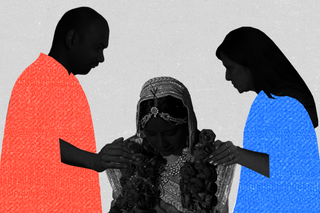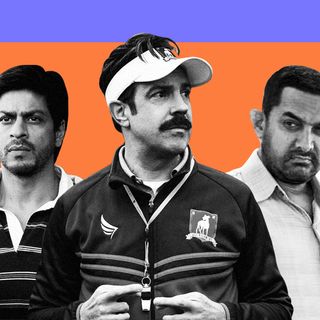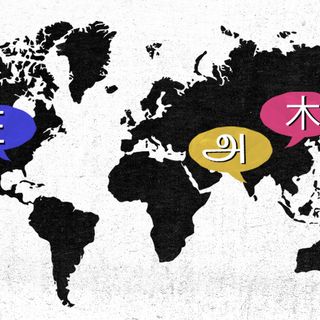
Many Indian Families Express Care Through ‘Bullying,’ Creating Patterns of Abuse
In India, what we’re often told is “love” and “care” is actually a violation of boundaries — making us prone to overlook abuse.

Anjana’s family used to call her a “tube light” because it took her longer to process things than other people around her. When angry, her mother would also call her “dumb” and an “idiot.” Over time, it took a toll on her self-esteem. “For a long time, I believed I was ‘slower’ and ‘stupider,’ and I let people make fun of me… It’s still a difficult process to let go of that core belief that I’m ‘stupid’ or have a ‘lower IQ,'” she says.
Like many Indians, the 23-year-old, too, was bullied in her formative years. Yet, the term “bullying” only brings to mind abuse from peers at school. Conversations about bullying thus often exclude instances of violation of one’s boundaries under the guise of “love” and “care” by one’s own family.
“Use of demeaning speech and other techniques are used [by parents] to make the child feel bad about themselves [that] leaves mental scars and leads kids to depression. [Many others] lay down autonomous rules and have unilateral expectations from their children. They do not have any right to question or discuss any rule,” notes an article on the different facets of bullying.
Apart from mental health issues, this kind of bullying can also have other lasting consequences on people’s psyche. Having different aspects of their lives controlled for years from a young age can render people unable to make trivial-seeming decisions independently.
Priyanka*, 26, says her mother would accompany her to salons well into adulthood to “ensure I didn’t cut it too short cause she knew I liked short hair and she didn’t. Later [in life], you understand the kind of impact it had on you when you weren’t able to decide something as simple as what kind of hairstyle you want for yourself.”
People become so habituated to being told “what to do” and “what not to do” that they experience “decision paralysis” when they have to make choices on their own, says psychotherapist Zohra Master, an associate fellow, and supervisor from the Albert Ellis Institute. The bullying that society constantly packaged as “looking out” can render one dependent on others.
One of the most extreme and widely publicized instances of such bullying is Britney Spears’ conservatorship, which allowed her father to harass her for years under the guise of caring for her and safeguarding her interests. Such behavior, however, is quite commonplace in Indian households. Where parents dictate their offsprings’ choice of career, life partner, the clothes they wear. Why? Because they’re family, and “they know better.”
Kavita*’s mother, for instance, “stuffed her opinions and beliefs down my throat under the pretext of motherly love.” If the 20-year-old even chose to have a different opinion, she was told that she was selfish and that she should be disgusted at herself, and was not welcome at the dinner table.
Related on The Swaddle:
Pinching, Shouting, Denying Food Among 30 Ways Indian Parents Abuse, Punish Children: UNICEF
But growing up in an environment that normalized bullying can prevent people from recognizing any abuse they’re subjected to even in adulthood.
Ananya*, 31, says her friends constantly violate her boundaries by reading her text conversations with potential dates and feel entitled to information about the men she’s talking to. They don’t extend her the same privilege when it comes to sharing details about their lives. Their reason: Ananya had made some bad choices in men she dated in the past, and they are simply looking out for her. She found herself unable to reject such unwanted intrusions because she could not instantly realize this was a violation of her boundaries and because she felt compelled to please people constantly. The latter is a common aftermath of different forms of childhood trauma, including bullying.
When one grows up in a household where people normalize bullying to express care, they associate it with respect. This often prompts them to seek out relationships where bullying would again be the norm because that’s what they associate with the idea of comfort, with “feeling at home,” Master explains.
Although they might not actively seek out bullies, the normalization of abusive behavior in childhood can leave adults confused about whether they’re genuinely being abused or misunderstanding the care and affection of people close to them. This happens even when their experiences clearly fit the textbook definition of abuse.
“When a woman is ‘questioned’ about her whereabouts — like, ‘Where were you? Who were you talking to? Why were you out so late?’ — it seems normalbecause she has probably grown up seeing men in her family ask these questions of their female partners,” Samriti Makkar Midha, a Mumbai-based psychotherapist, had told The Swaddle.
Being bullied under the guise of being cared for uses ideas of “noble” and “proper” to exert control over someone. Imagine how easy it becomes to gaslight someone, even if they manage to recognize the abuse they’re undergoing. “There is a thin line between caring and gaslighting,” S., 18 adds, explaining that well into adulthood, she struggles to understand when people in her life are violating her boundaries.
Moreover, since bullying under the guise of care often occurs in close relationships, people struggle to process the abusive behavior and come to terms with the fact that they’re being abused within the domain of an existing relationship they considered “safe.” “We don’t guard ourselves enough with people we consider ‘close’ or ‘friends,'” Nidhi says.
Bullying, essentially, occurs in relationships where there’s a power gap between two individuals — either in age, experience, finance, strength, clout or any other factor that allows one to be in a position of superiority, Master notes. In a parent-child equation, for instance, when a parent threatens to throw their child out of the house for not obeying them, all the child knows is that if they disregard what they’re told, they could be penniless and homeless — forcing them to oblige, Master explains.
Even if an individual tries to confront the family member who bullied them, the family simply tells them that boundaries don’t exist between Indian family members. N., 22, experienced this first-hand when she finally stood up to her elder sister. The latter had tried to control her every life decision all her life right until she moved out of her home to pursue higher education. By virtue of being 5 years older than her, her sister claimed she knew what was best for N.
Related on The Swaddle:
The Stereotype That Abusers Are ‘Bad’ People Can Prevent Survivors From Recognizing Real‑Life Abuse
But the normalization of bullying is a double-edged sword. It stops people from recognizing and respecting the boundaries of those they love. They’ve grown up with the idea that that’s how people express love. “You tend to disrespect, say, your partner’s boundaries, because that’s what you have been used to [seeing around you] your whole life,” Priyanka notes, adding that she had to work hard to ensure she’s conscious of the personal boundaries of those around her.
“Only recently did I realize I have a problem with respecting personal boundaries… I would crack mean jokes and felt a need to correct people’s behavior,” Vandana, 24 says. She grew up with a parent who not only prevented her from “having [her] own opinions” but also constantly violated her boundaries. Her parent monitored her every move, contacted her teachers at school, her advisor in her college hostel, and her friends.
Unfortunately, the normalization of bullying perpetuates it further — sometimes across generations. In the third season of Sex Education on Netflix, Micheal Groff bullied his son because his father and brother bullied him as a child. They forced him to behave like a “proper man.” But the years of being abused by Michael turned his son Adam, too, into a bully — despite Michael’s intent behind his behavior to improve Adam’s academic and extra-curricular performance.
This vicious cycle of familial perpetration is often not a result of ill intentions but simply a product of social conditioning and the normalization of bullying as “love” and “care.” Yet, its consequences are too scarring to ignore. But even if the individuals parented in this manner realize what it did to them and try to bring up their children differently, how many generations will it take to undo our messed up idea of boundaries?
*Name concealed to protect identity.
Devrupa Rakshit is an Associate Editor at The Swaddle. She is a lawyer by education, a poet by accident, a painter by shaukh, and autistic by birth. You can find her on Instagram @devruparakshit.
Related


Why We Root for Underdogs in Sports
